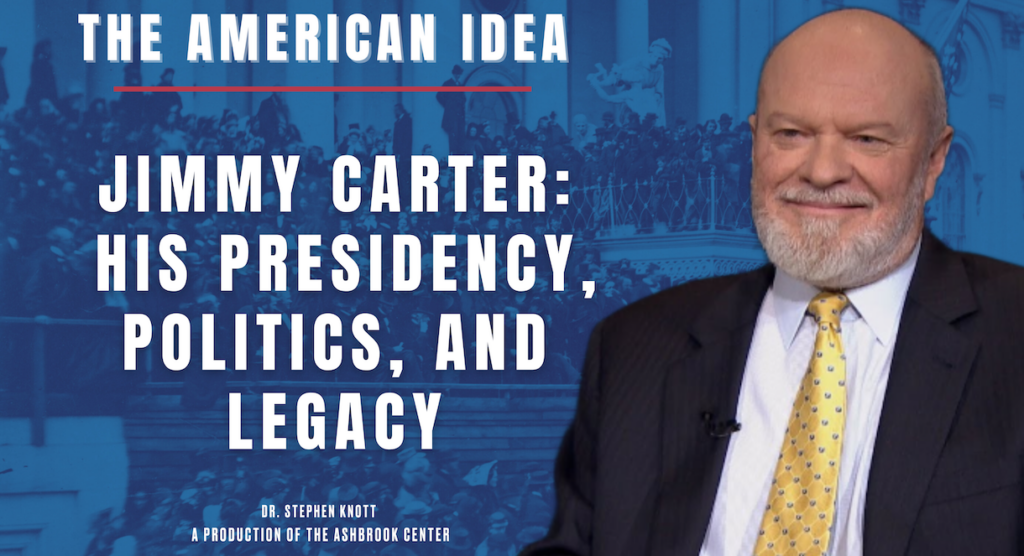Jimmy Carter: The Rise of an Unlikely President
January 29, 2025

Listen and subscribe to the podcast
Join The American Idea’s Listener Email list – get news about upcoming episodes and a chance to offer questions for them, too!
Roots in Georgia and the Navy
Jimmy Carter’s journey from a peanut farmer in Plains, Georgia, to the highest office in the United States was anything but conventional. After serving in the Navy’s submarine fleet, he returned home to manage his family’s business and soon found himself drawn into politics. His early years in public service were marked by a commitment to reform and racial equality, which carried him from the Georgia State Senate to the governor’s mansion. But it was the national disillusionment following Watergate and Vietnam that truly set the stage for his 1976 presidential campaign. Carter, a relative unknown outside his home state, positioned himself as the antithesis of Washington’s corruption, a moral leader who promised to restore integrity to the White House. His outsider status, initially a hurdle, became his greatest asset as he defeated the incumbent, Gerald Ford, who struggled to shake off the shadow of Nixon’s pardon.
Domestic Struggles and Political Isolation
Despite his initial popularity, Carter’s presidency quickly ran into turbulence. The country was mired in economic stagnation, with inflation and unemployment rising in tandem—a rare and troubling phenomenon known as stagflation. Though Carter spearheaded significant energy reforms and deregulated industries in an effort to revitalize the economy, his legislative efforts were stymied by a fractious Congress. While Democrats held a strong majority, Carter found himself at odds with the party’s liberal wing and congressional leaders like Speaker Tip O’Neill. His principled but sometimes aloof approach to governance alienated even his allies, leaving him politically adrift. In 1979, his so-called ‘malaise’ speech—though never actually using that word—attempted to diagnose a national crisis of confidence, but instead it became emblematic of a presidency struggling to inspire the American people.
A Shifting Foreign Policy Landscape
Carter’s foreign policy legacy is perhaps his most complex. From the outset, he prioritized human rights, a stance that shaped his approach to the Soviet Union and led to tensions with both conservative hardliners and liberal idealists. His administration initially sought détente, but the 1979 Soviet invasion of Afghanistan forced a dramatic shift in strategy. Carter imposed economic sanctions, boycotted the 1980 Moscow Olympics, and ramped up military aid to anti-Soviet forces—an early move in what would become a defining Cold War battleground. Meanwhile, his efforts to broker peace in the Middle East culminated in the landmark Camp David Accords between Israel and Egypt, a rare diplomatic triumph in an otherwise embattled presidency. However, his inability to swiftly resolve the Iran hostage crisis overshadowed these successes, sapping public confidence and further weakening his political standing.
The 1980 Election and a Lasting Legacy
By the time Carter sought re-election in 1980, he faced formidable obstacles. The economy remained sluggish, the hostage crisis dragged on, and his party was divided after an unexpected primary challenge from Senator Ted Kennedy. Against this backdrop, Ronald Reagan’s optimistic vision and clear messaging overwhelmed Carter’s campaign, leading to a decisive defeat. Yet, Carter’s story did not end with his presidency. In the decades that followed, he redefined the role of a former president, dedicating himself to humanitarian work through the Carter Center and Habitat for Humanity. His post-presidential activism, though widely praised, was not without controversy—his outspoken criticism of sitting presidents, particularly on foreign policy, sparked debate over the proper role of former leaders. Over time, historians have reassessed his tenure, acknowledging his integrity and commitment to principle while recognizing the political missteps that hindered his administration. Carter remains a study in contrasts: a leader of profound moral conviction whose idealism often clashed with the unforgiving realities of Washington politics.

